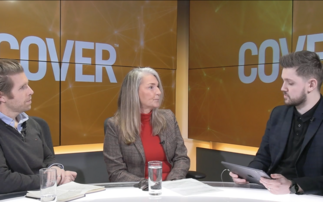
Julie Thompson, Protection Proposition Manager, Scottish Widows.
In the world of Protection, it's easy to assume everyone knows what income protection is and how it works but ask a handful of people with no protection knowledge and be prepared for a sea of blank faces and some interesting answers!
While there may be an acceptance that there is no such thing as a job for life, some still assume that jobs come with some longevity which simply is not the case. This is particularly acute for younger generations where 16 to 24 year olds not only change jobs more frequently than those aged 25 to 49, but they also have higher earnings growth if they do1. Couple this with the increase in gig working, social media influencing, digital nomads and ‘new' non-traditional jobs and you do have to challenge yourself to think is income protection as it's designed today even appropriate?
The need for income protection
With statistics showing that the average graduate has debts of £45,6002 and 52%2 of Gen Zers (typically those aged 12 to 27) saying they are very or extremely worried about not having enough money3, there can be little doubt that younger people are under more financial strain compared to previous generations. A good example of this is in the housing market, a traditional ‘milestone' for Protection needs, where an average deposit in England needed as a first-time buyer is taking up to 10 years to save for4, which inevitably means demand for rentals will (and are) increasing, along with cost.
44% of Gen Zers over the age of 18 consult social media as an initial source of information for things such as investments.
Engaging Gen Z
We need to start thinking differently when it comes to developing income protection and more importantly, talking about it. I have sympathy as engaging younger generations about Protection, and in particular income protection, is a challenge but one that as an industry we should embrace and face into.
With 44%5 of Gen Zers over the age of 18 consulting social media as an initial source of information for things such as investments, despite efforts from our industry to produce safe, meaningful financial content on these platforms, currently we simply are not able to compete against the likes of Emma Chamberlain, Charli D'Amelio or Alex Cooper. Who I hear you say? Point made.
Relevancy really comes into play here as no one wants to feel like the odd one out. As an industry we appear to talk a lot about ‘lack of cover' and in fact only 1 in 10 have income protection cover6, instead let's flip the narrative and start to focus on those that do have it. We can then draw out the positives using real life examples and relatable content, on the right platforms, so it starts to feel like the norm and builds that FOMO (fear of missing out for the uninitiated) momentum.
The answer
Staying relevant is hard, something I am acutely aware of as I get older, but it's important we do try to connect and engage with everyone, including those that may feel out of reach, particularly as 94%7of Gen Z in the UK use social media. For them, social media is more than just some nice pictures and an interesting video, it's a key form of connection with the world which educates, inspires and bonds them. While to ‘non-Gen Zers' this form of connection may feel uncomfortable, especially if you have little to nothing in common, plus you may be unfamiliar with mediums such as social media, but we should be embracing it.
We must not be dismissive or make assumptions about someone's level, or lack of, knowledge of income protection. This is a valuable product, particularly for younger people who may not have a mortgage or dependants but do have a quality of life they want to maintain and financial aspirations - all things income protection could and should help with. We have a duty of care to protect and educate them while being aware of how much the landscape has changed in terms of traditional milestones.
Impact for future product design?
Dare I say even the name income protection needs considered! As an industry we have been forced, rightly so, under Consumer Duty to consider customer harms and be more vigilant to this and how our products/ processes mitigate these. Clearly flexibility is helpful but back to my original point, if we are not even considering future harms for future generations, then we will fall at this first hurdle.
We need to work together as an industry and speak to as many people as possible to get credible views on what's important to them, as well as keep one eye on future challenges and threats. Getting this right will in turn allow better conversations around income protection as it brings that element of relevancy and authenticity which is arguably missing at the moment. As already stated, social media is a huge influence on the younger generation so how do we ensure as an industry that younger people are safe from misleading, and in some cases toxic, information?
As Gen Z has been termed the ‘distracted generation' due to the constant bombardment of different information and stimuli they are presented with, be that via their phone, tablet, headphones or all at once, I accept this is tough. Ensuring your most important points are up front and easily digestible plays into this mindset, along with being trustworthy. Considering this generation experienced the aftermath of what their parents may have gone through during the 2008 financial crisis it is not surprising they are less likely to trust financial institutions8, plus they are a whizz at internet fact checking hence, why being authentic is critical.
But they still can't afford it
Income protection is generally more expensive than life or critical illness cover and for a generation who are facing greater financial pressures than ever before, we need to be mindful of this. Having said that, we also know that the earlier protection is purchased, in general, the cheaper the cover payments will be. Plus, the fact we are witnessing a decline in risk behaviours such as smoking, drugs and alcohol use in younger people, particularly those at the younger end of the Gen Z scale9 should further assist with the price of cover.
As an industry we already know the potential benefits income protection cover can offer above and beyond the lifeline of a monthly payment. The additional services most providers offer grant access to things like therapy sessions, physiotherapy and GP appointments which are of particular value if people are travelling or moving regularly so cannot easily access a ‘local' health provider- and that's without considering current NHS waiting lists and lack of NHS specialist referrals.
We have a real opportunity to provide that financial safety net, along with all of the above, to add true value that can help younger people not just live but thrive- so let's be brave, let's do better, let's be better and capture the interests of younger people now.
Find out more about Scottish Widows Income Protection
Sources:
1 Office for National Statistics, Job changers and stayers, understanding earnings, 2022
2 UK Parliament, Student Loan statistics, 2024
3 Ernst & Young LLP, Gen Z Segmentation Study, 2023
4 Generation Rent, July 3, 2023
5 FINRA investor Education Foundation and CFA Institute, 2023
6 Scottish Widows YouGov research, 2024
7 Statista, Share of social network users, 2023
8 MX, Modern Banking Experiences for Gen Z & Millenials, 2023
9 Ball et all, The great decline in adolescent risk behaviours, 2023











